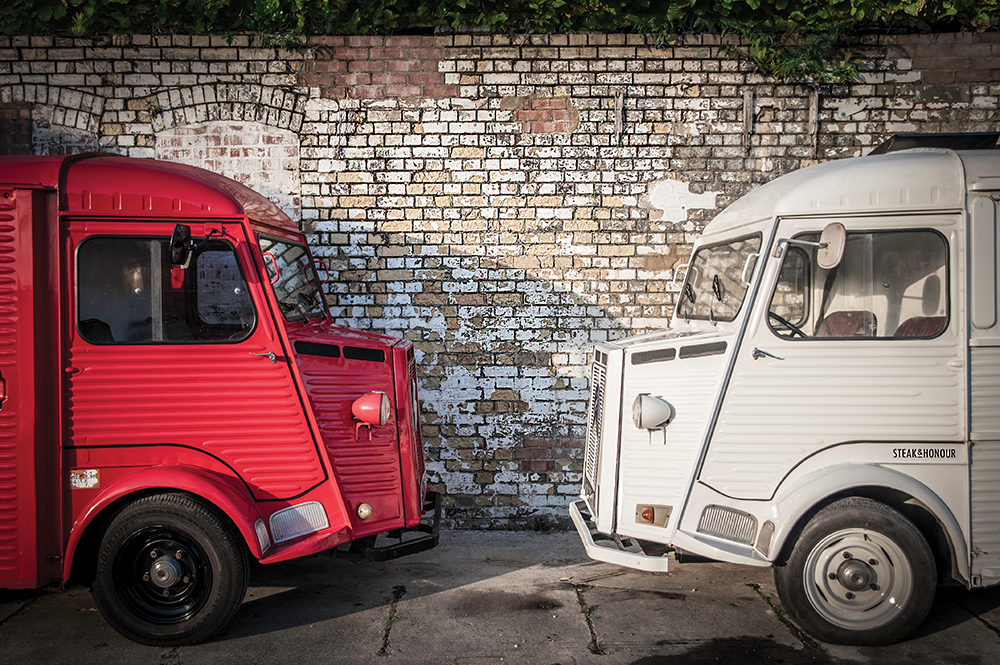Charlotte Griffiths finds out how one woman’s high standards changed the way Cambridge eats
If you’re talking about street food in Cambridge, then you’re almost certainly also talking about Heidi White. She founded, owns and operates foodPark, her collective of van-based street food traders. At lunchtimes, come rain or shine, she can normally be found directing operations as hungry guests descend on the thriving pop-up markets she’s set up around our city.
Inspired by London’s slick KERB street food markets – liking the look of the kitted-out vans and loving the food they served – Heidi spotted an opportunity to provide workers on their lunch breaks with a delicious alternative to a ‘meal deal’, while also helping these talented traders build a loyal following.
In working together and providing a consistent, exceptionally high-quality experience for customers, Heidi (below) and the street food traders she works with have, quite literally, changed the face of Cambridge’s high street. But we’ll get to that.
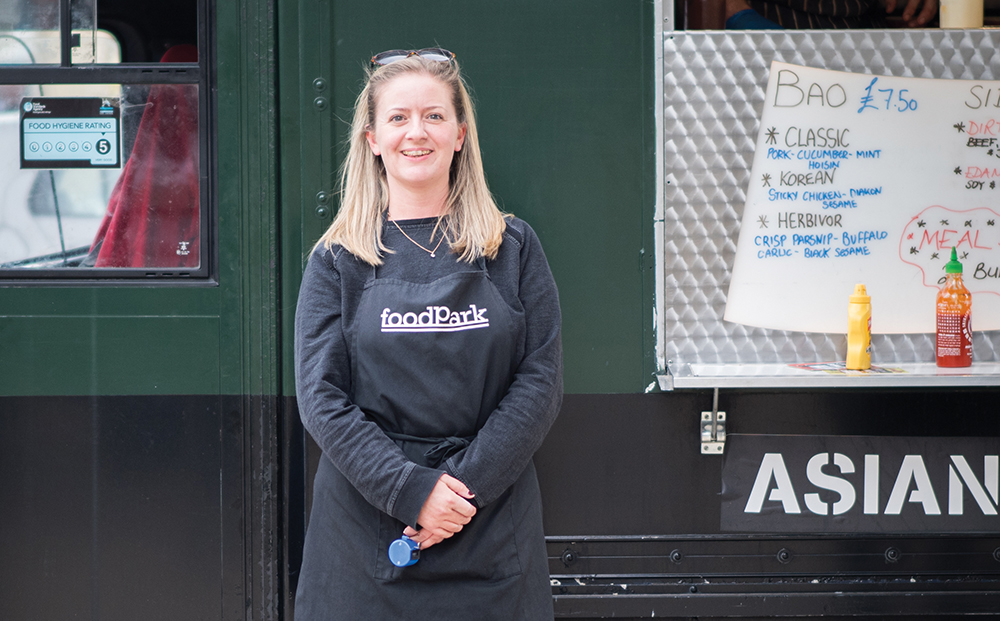
Six years ago, Britain’s food scene looked very different from today. Cambridge was still reeling from being described as the ‘worst clone town in Britain’ a few years earlier. In London, KERB founder Petra Barran had just started gathering together street food traders for its first market. FoodParlk’s website’s ‘About’ page paints a romantic picture: “It was at the dawn of a new era where people were leaving desk jobs with steady incomes to pursue dreams of becoming street food traders so they could cook the food they loved, directly to their customers, on their own terms.”
In Bottisham, local burger legends Steak & Honour were embodying that dream and preparing for their very first outing at Parsonage Farm, after buying a Citroën H van from eBay, spending a year restoring it to full health and installing a commercial-spec burger kitchen.
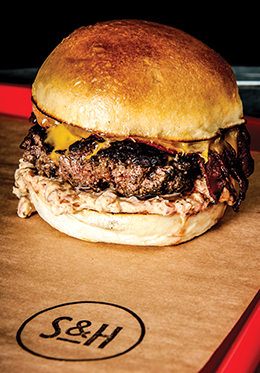
Charley McKie-Reitoff and her chef husband Leo Reitoff originally started Steak & Honour as a way of giving Leo more creative freedom, while also playing to her strengths as a communicator. The couple had identified – correctly – that with street food, the “experience” was just as vital as the taste of the product. “It was so important to have a customer connection,” Charley says, “and the van was the first time some people had seen the ‘theatre’ of street food. I was so proud of what we were doing, the food we were making, and wanted to share that enthusiasm with people. We both have high standards in different ways, so it worked really well.”
Steak & Honour’s distinctive style has been part of foodPark since Heidi announced her first lunch market in 2014. The pursuit of perfection from food and the experience are core values shared by Heidi – and are ones that she now demands from all foodPark traders. “If you think about Steak & Honour, which is what I was starting foodPark with, that’s quite a high bar to set,” Heidi says. “Their van was a striking vintage conversion, they had clear branding and were real perfectionists – the menu, the product, the van, everything – and that was what I was looking to follow.”
Cambridge’s street food scene is rare for many reasons. Most of the names that were there at the start of foodPark – Steak & Honour, Jack’s Gelato, Tin Kitchen – are still active traders today, and a lot of the trucks house experienced top-flight chefs who’ve left restaurants to seek out a new (no less frenetic) pace of life. Some even started businesses because of foodPark: The Wandering Yak and Kura Kura, now hugely successful and much-loved food vendors, dreamed up their vans to fit in with the foodPark ethos.
You don’t see flash-in-the-pan traders who disappear overnight, nor do you see businesses who rock up half asleep with a cool box of food and a menu printed in wonky Arial. At the centre of this delicious Venn diagram is Heidi and her fierce commitment to high standards.
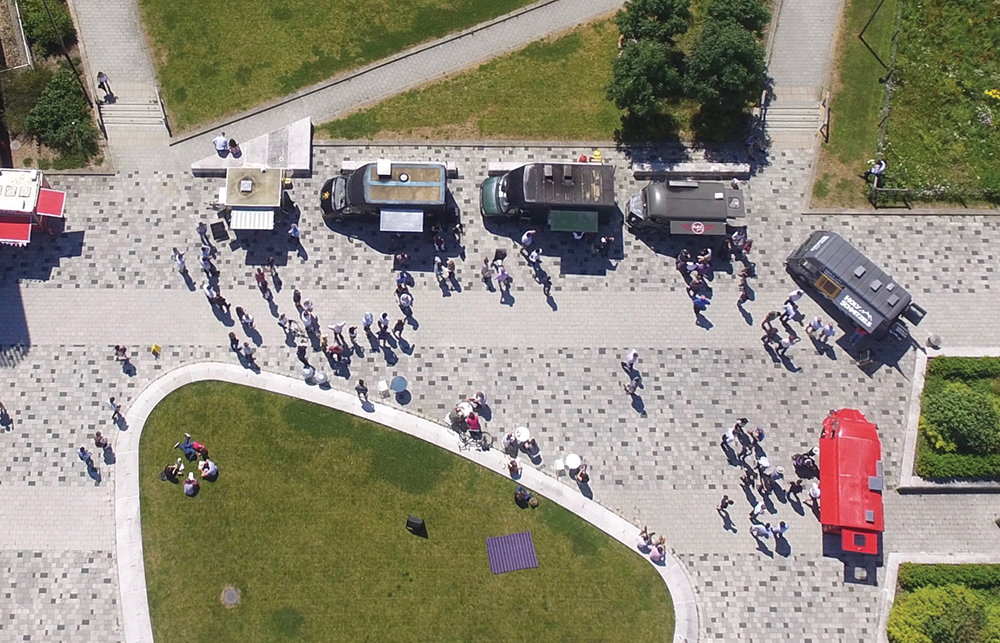
Image: a birdseye view of one of foodPark’s markets (AP Aerial film)
“I definitely ended up putting off approaches from people who were just looking to ‘have a go’,” she says. “Right from the beginning [foodPark was approached by] younger, inexperienced people who just fancied starting a food van. When I presented them with the criteria, showed them the style we were looking for and the kind of menus we had, they just sort of… selected themselves out. I could tell some weren’t going to work, they just weren’t realistic about how they were going to make a living out of it – and for the younger ones, that element is a big factor. Cambridge is expensive to live in.”
Heidi had a clear vision for the look and feel of foodPark right from the start. “If you look at some street food markets in other cities, they’re actually just lines of gazebos, which is not what I think of as a street food market,” she says. “It should be a van driving up and serving. I think [having a vehicle] is the most efficient way – the set-up needs to be minimal in order to serve for two hours and maximise the revenue for the small business. There’s so much prep that goes on behind the scenes, so hourly rates are already tight; you don’t want to lose half an hour setting up.”
Of course, if the trader has to have a van, they’re going to have to be pretty serious about their street food dream: for a wheeled, made-to-measure kitchen you’re looking at paying around £50,000. “This is maybe why our traders are mainly more experienced people,” says Heidi. “They’ve gone all-in to make sure their business works.”
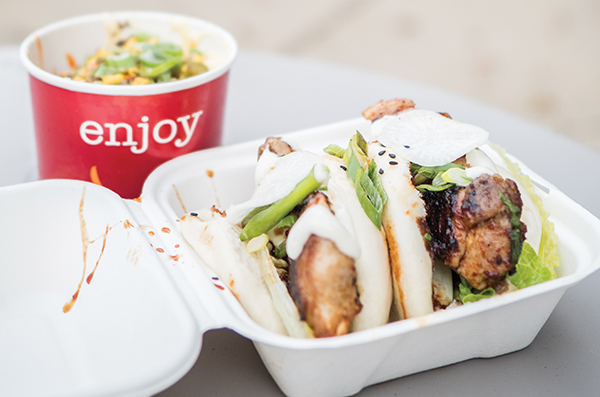
Images: A bao from Geurrilla Kitchen (above) and a scoop from Jack’s Gelato (below)
Many people around Cambridge now see foodPark and its traders as a canteen and have come to rely on the line of trucks always rolling up at the same time, in the same spot, on the same day of the week. Consistency is definitely a key to foodPark’s success. “That’s something that’s been important from the start – to always be there when we say,” Heidi explains. “We’ve rarely had to change even a trader – we’re always there, that’s a given – but even the line-up is pretty consistent. The only time a trader might not be there is if they’ve broken down. I suppose that is a problem with vans, which you wouldn’t get with gazebos,” she smiles.
The result? Exceptional quality, every time. “We have eaten a lot of street food over the years, from research in the early days to now,” says Steak & Honour’s Charley. “And the quality in Cambridge is just so much better. Heidi’s kept the standard high.”
But it’s not just hungry lunchers who have gained from the passion and commitment of everyone involved in the street food scene. Many of the successful traders have returned to running bricks and mortar operations alongside their mobile businesses. After partnering with Dave Underwood, another local chef, Steak & Honour expanded to a fleet of three vans and its restaurant opened on Wheeler Street at the end of 2016.

And a few doors down the road, its old foodPark pal Jack’s Gelato moved in for year-round scooping. It’s this area of town that Heidi points to as an example of the power of the consumer: after the independents moved in and raised the area’s profile, chains spotted the same opportunity.
“These bigger, ‘better’ chains followed [the independents], such as Sticks‘n’Sushi and Honest Burgers – and then the less good chains there actually closed down,” Heidi says. “I’m just one person and people probably think I’m quite ‘small’, but there, foodPark has literally changed the food and drink make-up of the high street.
“Cambridge encouraged businesses to relocate [to Bene’t Street] and weeded out ones that didn’t meet the standards. Customers definitely vote with their feet, but I don’t think people properly appreciate their power. These are the things the customers are wanting, so it will be. Like Field of Dreams!” she laughs. “If you sell a non-corporate burger, they will come…”
Track down foodPark on social media of at foodparkcam.com

